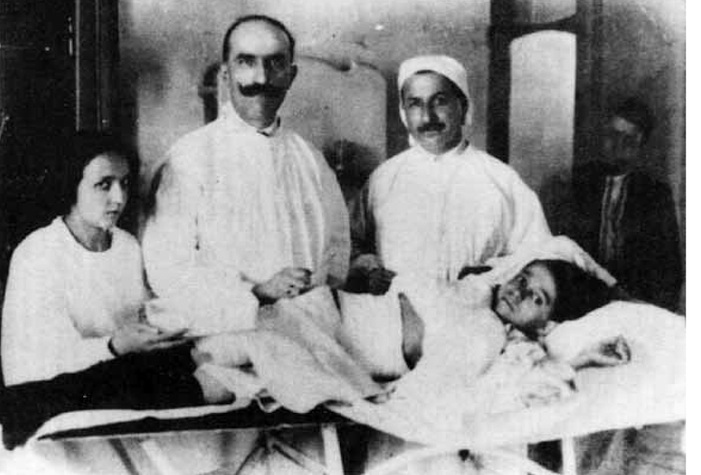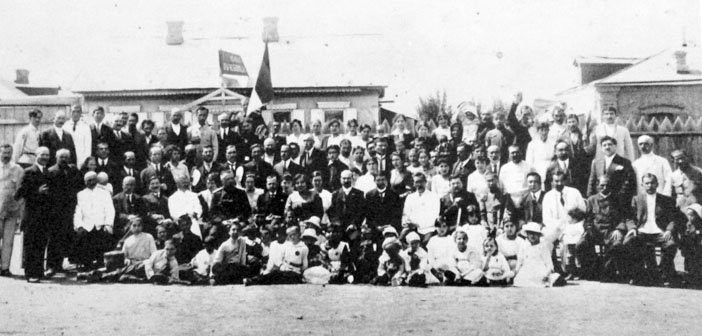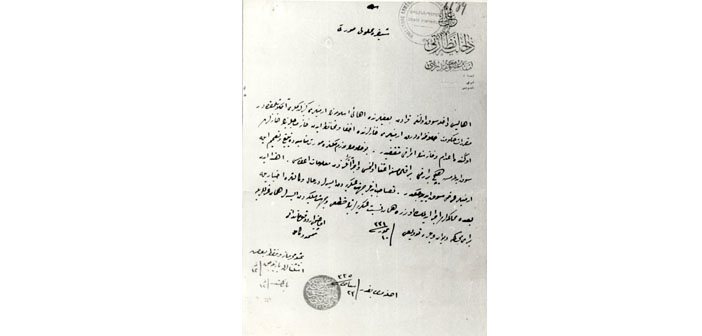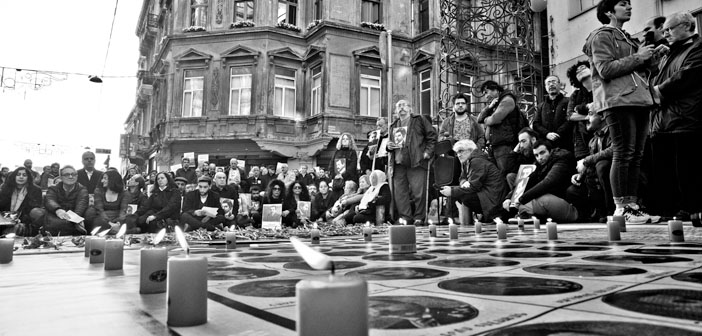The biography of Dr. Avedis Cebeciyan is compiled from the book that his son, Robert Cebeciyan, wrote and published in Aleppo in 1999: “Autobiography, Memoirs and Activities of Robert Cebeciyan”. In the book, there is also an introduction by Prof. Ayhan Aktar that is titled “War and Genocide Diary of Dr. Cebeciyan”.
The things that Avedis Cebeciyan, who was a doctor from Antep, went through during the WW I bring a different aspect of the Armenian Genocide into the light. While he was at service as a surgeon at Çanakkale Front, his wife Yevnige and his kids were subjected to deportation and forced to go to Aleppo.
From Antep to Aleppo
Born into an Armenian Protestant family in 1876, Avedis Cebeciyan went to a Protestant primary school in Antep. Then, he graduated from Antep Getronagan College in 1896. After he taught Armenian as an assistant teacher at the same school for two years, he went to Syria Protestant College in 1898 and then to American University of Beirut in order to study medicine. He graduated in 1902 and returned to Antep. After practicing medicine in Urfa for a while, he worked at Antep American Hospital with the chief of medicine Lorrin Shepard between 1904-1906. In 1907, he made researches in Germany and Switzerland to get better in his profession and moved in to Aleppo in 1908.
At the same year, Cebeciyan married Yevnige, the daughter of Hagop Kundakcıyan, who was the preacher of the Armenian Protestant Church in Amanos Hasanbeyli Village in Adana. In 1909, in the time when the Armenian massacres in Adana began, Hagop Kundakcıyan was murdered while he was on the road to attend the Cilicia Protestant Churches Association Congress. When the WW I erupted, Dr. Cebeciyan was called up on 3 October 1914. He served as a surgeon on Çanakkale Front between 1914-1916, and then on the Eastern Front (Maraş, Pervari, Malatya, Harput, Palu, Diyarbakır, Siverek, Siirt, Bitlis, Tatvan, Van, Bayazıt).
“Mild Deportation”
After her husband was conscripted, Yevnige Cebeciyan went to Aleppo with her two daughters in order to stay with her husband’s parents. And in 1915, Armenians began to be massacred and deported. Since Avedis Cebeciyan was serving as an officer for the Ottoman army, the family was subjected to –with his son Robert’s own words– a “mild” deportation. Yevnige, her father- and mother-in-law and her children arrived at Aleppo and they were allowed to live there during the war. They rented a sizeable three-storey house, which was located right behind the Baron Hotel that was managed by the famous Mazlumyan family and they provided a shelter for many people during those difficult times. Some days, they hid 23 people in their house; many Armenians escaped death and migrating to Der Zor thanks to Cebeciyan family.
However, other members of Cebeciyan family weren’t that lucky. They had never heard from many family members who were forced to emigrate to Hama and Der Zor. Some members from the family of Krikor Cebeciyan (Avedis Cebeciyan’s brother) were deported to Selimiye region on the southern Syria, and the ones who were left behind survived thanks to Ismaili people, and they managed to return to Aleppo in 1918. In his memoirs, Robert, Avedis Cebeciyan’s son, wrote that 25 people from their family were murdered in 1915.
A Witness to the Genocide
Dr. Cebeciyan served as a surgeon for Ottoman army from the beginning of the WW I. During the war, he studied Greek when he had time; he tried to learn reading music and playing mandolin. He kept a diary (in Turkish with Armenian alphabet) between 1914-1918. While he was witnessing the most terrible aspects of the war, he also lost his loved ones and many people from his family in 1915 because of the policies against Armenians. Moreover, during his service on the Eastern Front, he saw the Armenian settlements that were deserted and ruined after the deportation and massacres.
After the War
After The Armistice of Mudros had been concluded, Dr. Cebeciyan traveled for months and managed to return to Aleppo. Then, Dr. Filip Hovanyan, who was Cebeciyan’s relative and also studied medicine in American University of Beirut, shared his office with him and he continued to practice medicine there. They provided health service for the survivors of the genocide who were living in the camps and slums in Süleymaniye neighborhood. Later, they founded Cebeciyan-Hovanyan Hospital. In 1934, his son Robert became a doctor too. He also studied in American University of Beirut and became an ophthalmologist. Dr. Avedis Cebeciyan continued to practice medicine until 1951; that is, one year before his death. He is buried in Aleppo Armenian Cemetery.
Dr. Avedis Cebeciyan returned to Aleppo after the WW I and he never saw his hometown Antep again. Some members of Cebeciyan family live in Aleppo today despite the ongoing civil war.
FROM THE BOOK
“I think no one could be happier than me to have received this news”
16 April 1915, Gallipoli
This morning, the weather was nice and calm, I went to the seaside for swimming, it is the foundation land of the church. There are 200 Armenian households there. Toward the midday, while I was coming back from swimming, I saw a plane that was coming from the direction of Saros. It came and began to fly above the city; everyone was out to watch it. Barbaros battleship was staying in the port, it dropped to bombs on it; it missed and they exploded in the water. Then, it flew for a short while and left. In the afternoon, I wandered around with my doctor friend Papadopulo on horseback. Then, we heard the sound of a plane again; my friend got very scared. This plane also flew above the city and dropped several bombs; one bomb hit the Armenian neighborhood and I went there. The bomb created a 2m diameter and 1m deep hole. There was a house near the hole and all of its windows were shattered. Fortunately, no one died. We shot cannonballs at the plane, but they didn’t reach it. Then it flew away. Toward the evening, four more planes were seen in the direction of Çanakkale. They shot at them too, but I don’t know what happened; they didn’t come to us. I talked to my friends and went to sleep.
25 April 1915, Kemerli
At the dawn, the noise of the cannonballs woke me up; a horrible noise. I got up and prepared to go to Kemerli. We hit the road, climbed and arrived there at 9 o’clock; the heavy shelling was still going on, 5 or 6 planes were firing at bulwarks from all directions. Yesterday, one of our soldiers had lost his brother during the bombardment. The water was reaching at the height of two minarets combined where the bullets hit. It was taking 40 seconds for water to rise and settle again. The ships of the enemy were approaching to the entrance of the strait. Now, I am sitting under a pine tree on a high hill; I write, watch and hear the sounds at the same time. Our battleship Barbaros cannot stay in front of the round castle, it swims around; they say that a submarine is there and Barbaros is afraid of it. Some part of the unfortunate, submerged Mesudiye battleship can be seen ahead. The firing continued until the evening. The school of the mosque is our new room; I dined and went to sleep.
31 March - 5 April 1917, Diyarbekir
Two days ago, we came to Diyarbekir. Diyabekir plain is a quite [an unreadable word] place. I came across sorrowful scenes on the road; there were the bones of Armenian people everywhere. I am unofficially told that I was appointed to Severek [Siverek] hospital. I will go there in couple of days. Within last couple of days, America declared mobilization. China broke off its relations with Germany. In Russia, the revolution still continues. It turned out that Baghdad has fallen too. I saw that even this city is ruined; everywhere is in ruins. I sent a postcard to the home.
6-9 April 1917, Diyarbekir
I still haven’t received an official notice regarding my appointment. However, it seems that I will go to Severek for sure. On the previous day, we read that America has declared war. English soldiers continue their attack around Gaza and Jerusalem; important battles are taking place. A report was received from the 4th Corps Forces Command in Palu saying that we, the board of the hospital, are not trustworthy. Let’s wait and see what will happen.
10-18 April 1917, Diyarbekir
In these days, we have free time. We are calculating our funds. I received an official notice regarding my appointment to Severek. America declared war. Two days ago, Bulgaria finally declared war against America. Germans are still retreating on the Eastern Front. Neighborhoods like Verdun, Rennes and Roi are being evicted. Maybe, I will be appointed to Mardin. I would prefer Mardin to Severek, because I can go there by train. We gave a really good answer to the report that came from the 4th Corps Forces Command; so, no problem there.
5-6 October 1918, Bitlis
Today, we heard that Ferdinand was dethroned and his successor Boris III took his place. We read that Germany, Austria-Hungary and Turkey have accepted the peace agreement with 14 items, which was proposed by Wilson last year, and they were ready to peace and immediately put this agreement into action in all fronts. The war is considered to be ended. I think no one could be happier than me to have received this news. Because of that, I couldn’t have slept last night and now I feel tired.





